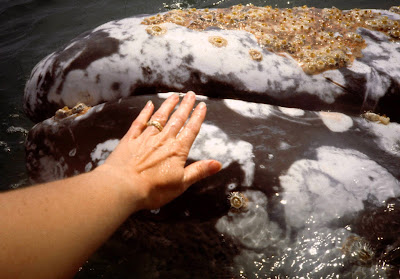It's been 100º or more the last few days and all I want to do is sleep. Work goes undone, projects languish, errands are put off. I decide to close my eyes for a minute and wake an hour later. This is not typical for me so I ask why, and then wonder why I ask. What difference does it make? None at all.
I return to my book, Becoming Wild by award winning writer Carl Safina, but I am thinking about Afghanistan, the endless debacle and the horror to come. Safina's book is about animal cultures, specifically the lives and cultures of sperm whales, macaws, and chimpanzees. He also places those creatures and their cultures in a broader context, including the world we humans have created and now may destroy. "The human species," he writes, "has made itself incompatible with the rest of Life on Earth."
Don't let that thought stop you from reading though; it's a book filled with delight, unexpected creature behaviors and intelligence and glorious beauty.
I read the section on whales with special pleasure because I have long been fascinated by them, and in 1983 I was able to pet one. I was working for an environmental travel company at the time and one of the perks was an occasional free trip. A colleague and I joined a week-long whale watching expedition that left San Diego for San Ignacio Lagoon, where the gray whales winter, socialize, breed and birth their young.
Since 1988 the lagoon has been part of an extended protected area, and since 1993 a World Heritage site. Though not officially protected when we were there, Mexico had strict rules about what was permitted. Our cruise included stops at other islands, and talks and hikes led by two biologists. But seeing the grays was the real goal.
The larger vessel was not permitted near the whales so for three days we divided ourselves into groups of four to six and climbed into three waiting open boats. Then we motored slowly toward areas whales had been spotted. We saw them every day, often up close, but I especially remember two occasions. (We were not permitted to approach them within a certain distance, but obviously they could approach us.)
It was our first day on the lagoon and we were sitting silently under cloudy skies, looking, looking, hoping. Suddenly a fully grown whale (they reach about 49 feet) rose up beside us. She could easily have toppled our boat but instead she silently circled as we reached out to touch her. Our meeting was brief, maybe 10 minutes, and then she was gone. But I remember looking into her eye as she looked back and I had no doubt she was an intelligent creature, as curious about us as we were about her.
On our third and last day we were visited by a youngster and his mother. The young one—still longer than our boat—clearly wanted to play. He swam around and under us, poking his big head up to look and be touched. His mother, off to one side, let this go on for for a few minutes and then the two moved away. A few minutes later he was back again, apparently with permission, for mom was nowhere in sight.
A second boat joined and the youngster visited us both, raising up to look, diving, circling and curious, willing to be touched and petted. The encounter went on for 15–20 minutes and then, suddenly, here was mom diving under the two boats and taking junior with her. She was at that moment every mother everywhere, standing off to one side while junior played until, "Okay, you've had your fun; it's time to go."
Gray whales live for 55–70 years and navigate our western coast twice a year. If you're lucky you see them spouting as they pass. They and their ancestors have been on earth 30 million years and were almost wiped out by the whaling industry—which, to my shame, my ancestors played a role in. These animals have a culture, just as we do. They communicate, have family and friends and move through life with awareness. They do not make war on their own kind.
Which sadly brings me back to Afghanistan. We might have learned after watching the USSR withdraw after years of struggle, but hubris is strong in America's military, and in our leaders, and here we are: embarrassed, ashamed, regretful, and angry. I fear for those who helped us fight for 20 years and are now being searched out and murdered. And I fear even more for the women and girls left behind, for men will do what men always do. The U.S. presence created opportunities for education and a future for women, an implied promise that now feels more like a curse. I hope we don't desert them.
"We are" writes Safina, "the only species that makes global problems. It would be useful if there existed a species that solved them." Amen.

No comments:
Post a Comment